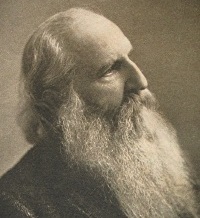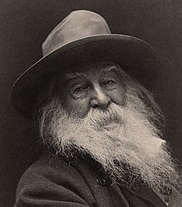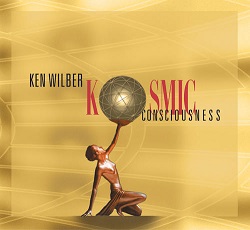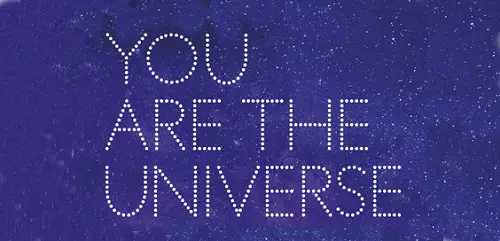|
TRANSLATE THIS ARTICLE
Integral World: Exploring Theories of Everything
An independent forum for a critical discussion of the integral philosophy of Ken Wilber
 Since 1990 Gary Stogsdill has been a faculty member at Prescott College where he currently teaches courses in humanistic mathematics, science appreciation, and wisdom studies. He has a blog called " Pursuing Wisdom Now", which features articles on contemporary spirituality.
SEE MORE ESSAYS WRITTEN BY GARY STOGSDILL
Cosmic Consciousness, Maurice Bucke, and
Walt Whitman
An Adventure in Narcissism
Gary Stogsdill
You are definitely not the universe, but surely the gift of human life is a big enough miracle.
Canadian psychiatrist Richard Maurice Bucke is remembered for authoring the immodestly titled book Cosmic Consciousness: A Study in the Evolution of the Human Mind, published at the end of his life in 1901. Maurice Bucke, as he preferred to be called, became interested in altered states of consciousness at the age of 35 after spending an evening reading the poetry of Wordsworth, Shelley, Keats, Browning, and Whitman that resulted in the following spiritual or peak experience: “a sense of exultation, of immense joyousness, accompanied or immediately followed by an intellectual illumination quite impossible to describe” (p. 10).
Convinced that his peak experience was the ultimate in the evolution of the human mind, Bucke embarked on a study of historical and contemporary figures whom Bucke believed had also experienced this exalted state. Chief among the luminaries discussed in Cosmic Consciousness—which included none other than Buddha and Christ—was the poet Walt Whitman, whom Bucke met in person five years after Bucke's own peak experience described above. More on Whitman in a moment, but first let's get to know Maurice Bucke.
 Richard Maurice Bucke
Richard Maurice Bucke
Bucke was a champion of the eugenics movement of the late 19th and early 20th centuries, a movement that would culminate in Hitler and the Holocaust. As director of a mental hospital in Canada, Bucke personally and without permission sterilized well over 100 women under his “care,” this being his perceived contribution to the betterment of humanity [1].
By definition Bucke was racist and sexist. He openly claims in Cosmic Consciousness that over the last few millennia the “Aryan race” has developed their mental faculties much more rapidly than the other races, which he refers to as “backward and stationary peoples” and as “savages and semi-savages” (p. 58). Bucke thought that a new mental faculty like cosmic consciousness would first appear in “only...the best specimens of the [Aryan] race,” which would naturally be “individuals mostly of the male sex, who are otherwise highly developed—men of good intellect, of high moral qualities, of superior physique” (p. 65). Superior physique?
When Bucke met Whitman, he was completely smitten with the poet, saying after a page-and-a-half of gushing praise that “no description can give any idea of the extraordinary physical attractiveness of the man” (p. 217). Here's a sampling of Bucke's doting on Whitman: “The ear is very large, especially long from above downwards, heavy and remarkably handsome” (p. 216). The ear? Bucke concludes his appraisal of Whitman with this: “Walt Whitman is the best, most perfect, example the world has so far had of the Cosmic Sense” (p. 225). Well, definitely his ear.
Clearly, Bucke had a man-crush on Whitman, which is perhaps understandable given that both of Bucke's parents died in his childhood, and that Bucke probably saw the 18-years-older Whitman as a father figure. But does Walt Whitman deserve the extraordinary designation as the most perfect example ever of cosmic consciousness, surpassing even Buddha and Christ?
Yes, Whitman was a poet of distinction. His life may have been otherwise. My assessment from reading Justin Kaplan's Pulitzer-Prize-nominated biography, Walt Whitman: A life, is that the two words most often used by Whitman's contemporaries to describe him were egotistical and lazy. In fact, biographer L. Edmond Leipold called him “an egotist without parallel” [2].
 Walt Whitman
Walt Whitman
When Ralph Waldo Emerson read Whitman's first edition of Leaves of Grass, Emerson sent Whitman a letter expressing appreciation for the poet's fresh, bold style (it was customary of the benevolent Emerson to extend such encouragement to younger writers). Without Emerson's consent or knowledge, Whitman had the letter published in the New York Tribune. Emerson was furious at this impropriety, with his friends saying it was the only time they had ever seen Emerson truly angry. Without a shred of remorse, Whitman then prominently displayed Emerson's letter on the cover of the next edition of Leaves of Grass, again without Emerson's consent or knowledge. A Boston newspaper called this “the grossest violation of literary comity and courtesy that ever passed under our notice” (Kaplan, p. 207).
Whitman also embarked on a campaign of writing anonymous reviews filled with hyperbolic praise for Leaves of Grass, sending these reviews to every newspaper and journal he could think of. Here's a taste of what the anonymous Whitman said about his own work when Leaves of Grass had sold fewer than 10 copies: “an extraordinary sensation in the literary world on both sides of the Atlantic” and “the most glorious of triumphs in the known history of literature” (Kaplan, p. 208).
Shortly before he died, Whitman ordered the construction of a massive stone temple to serve as his tomb, with large letters engraved at the top: WALT WHITMAN. Some of the stone blocks weighed 10 tons each, and the granite door he ordered “proved to be too heavy to be hung” (Kaplan, p. 50). At a time when Whitman was living off the charity of others, he spent 4000 USD of their money on this tomb, more than twice what his house had cost, and well over 100,000 USD in today's currency.
The above stories suggest that Walt Whitman had strong tendencies toward narcissism. In a previous essay, "Perennialism and the Myth of Narcissus", I wrote that the textbook definition of narcissism includes “grandiose views of the self,…the assumption that one is unique or 'special,'…desire for admiration, a sense of entitlement…, and little empathy for others and a willingness to exploit them” [3].
Whitman's sense of entitlement, lack of empathy, and willingness to exploit others are illustrated by his self-serving and brazenly improper treatment of the private letter that Emerson had written to him. Whitman's grandiose views of self, assumptions of being special, and desire for admiration are illustrated by the monumental tomb he constructed for himself, by the self-praise he wrote about his Leaves of Grass (“the most glorious of triumphs in the known history of literature”), and by the fact that his longest poem by far is Song of Myself (in my edition it's 56 pages long and opens with, “I celebrate myself, and sing myself”).
Perhaps there should be nothing more to this story than the odd case of a narcissistic poet and an admiring devotee who fell in love with his own peak experience and then with Whitman himself, writing a ridiculous and racist book identifying “the best [male] specimens of the [Aryan] race” who possess “exceptional physique—exceptional beauty of build and carriage, exceptionally handsome features, exceptional health, exceptional sweetness of temper, exceptional magnetism” (Bucke, p. 61).
But of course there is more to this story. The term cosmic consciousness would become a catch-phrase in the middle and late 20th century because it conveniently served the enterprise of gurus from India. For example, Paramahansa Yogananda, Krishnamurti, Maharishi Mahesh Yogi, Swami Bhaktivedanta, Swami Rama, Yogi Amrit Desai, Swami Satchidananda, Swami Muktananda, Rajneesh, and Sathya Sai Baba all advertised their teachings with this catch-phrase and often their disciples proudly used the phrase to exalt the guru. Popular spiritual teachers including Aldous Huxley, Alan Watts, Joel Goldsmith, and Deepak Chopra would continue to exploit the appeal (and financial benefit) of this phrase.

Then Ken Wilber would raise the bar with his more integral term "kosmic consciousness" and his 2003 audiobook of that title [4]. Wilber defines kosmic consciousness as “when you are everything that's arising every moment” (disc 3). Really? Our observable universe is approximately 100 billion lightyears across (scientists believe there's definitely much more that we can't observe due to the effects of cosmic inflation), with some 1080 atoms of observable matter (and five times more dark matter that remains currently unidentified by science) [5]. The number 1080 is hard to even conceive of; if I were to write it out in terms of “millions of millions,” I would need to write the word million 13 times. Atoms are energetic systems that have something “arising” every moment. This arising increases exponentially as we move to higher levels of organization: molecules, cells, organisms. On a good day and for a short period of time, I can probably hold two or three arisings in my awareness at once. Wilber would have us believe that the human mind can hold vastly more than 1080 arisings at once, a thought so grandiose as to outdo even Walt Whitman.
Wilber would have us believe that the human mind can hold vastly more than 1080 arisings at once, a thought so grandiose as to outdo even Walt Whitman.
More academic, and therefore more measured, spiritual teachers also tend to get carried away with wishful thinking about cosmic consciousness, Bucke, and Whitman. For example, Integral World author Steve Taylor recently published an essay in Psychology Today titled "Cosmic Consciousness: The Wakefulness of Walt Whitman" [6]. Unfortunately, this essay shows no critical awareness of who Bucke and Whitman were as people, and instead uses Whitman's poetry as an advertisement for the much-coveted state of consciousness that Taylor calls wakefulness, others refer to as enlightenment, and our friends Bucke, Chopra, and Wilber call cosmic consciousness (or kosmic consciousness).
All of this has happened, at least in part, because Maurice Bucke had a peak experience from reading poetry and then aggrandized it in a racist book. The term peak experience was coined by humanistic psychologist Abraham Maslow and discussed in his 1964 book Religions, Values, and Peak-Experiences. Just before his untimely death in 1970, Maslow realized that a more stable and perhaps more valuable expression of consciousness was what he called a plateau experience, “the simultaneous perception of the sacred and the ordinary” [7]. A plateau experience is more serene and calm, more integrated into our day-to-day lives.
I suspect we've all had both peak experiences and plateau experiences, from being deeply moved by music or nature, to feelings of love, to a sense of oneness with external reality. It's part of being human for our consciousness, on occasion, to spike into a peak experience and also to sense the ordinary miracle of life in a plateau experience. However, human nature seems to always want more, causing some of us to believe we should have more than the ordinary miracle of being human. This is why so many gurus and spiritual teachers are in the business of selling us cosmic consciousness or enlightenment or wakefulness.
Our susceptibility to the hucksters of cosmic consciousness is due partly to the human need to feel special. And what could be more special in a narcissistic way than the assurance from Wilber and others that “men and women can grow and develop (or evolve) all the way up the hierarchy to Spirit itself” [8]. Or as Deepak Chopra likes to say, “You are the universe!” a thought that would make any narcissist proud, including Walt Whitman.
You are definitely not the universe, but surely the gift of human life is a big enough miracle. What could be more special in a healthy way than realizing that we humans are the beneficiary of 13.8 billion years of cosmic evolution? We are gifted with intellect, feeling, imagination, wonder, ethical sensibility, and the capacity to serve the greater good of the adventure of life on planet earth within a universe that we know not how or why should exist. What could be more miraculous and special... and ordinary and humbling, all at the same time?
NOTES
[1] http://www.bible.ca/psychiatry/cosmic-consciousness-richard-maurice-bucke-1901ad.htm.
[2] Judith Connors, “Biography of Walt Whitman,” in Walt Whitman, edited by Harold Bloom, p. 28).
[3] W. K. Campbell and J. D. Foster, “The Narcissistic Self: Background, an Extended Agency Model, and Ongoing Controversies” in The Self, edited by C. Sedikides and S. Spencer, p. 116).
[4] Ken Wilber, Kosmic Consciousness, Sounds True, 2003.
[5] John Carl Villanueva, "How Many Atoms Are There in the Universe?", www.universetoday.com, July 30, 2009.
[6] Steve Taylor, "Cosmic Consciousness: The wakefulness of Walt Whitman", www.psychologytoday.com, March 13, 2017.
[7] Nicole Gruel, “The Plateau Experience: An Exploration of its Origins, Characteristics, and Potential,” Journal of Transpersonal Psychology, 2015, Vol. 47, No. 1, p. 47.
[8] Ken Wilber, “The Great Chain of Being,” in Roger Walsh and Frances Vaughan, Paths Beyond Ego, p. 215.

|
 Since 1990 Gary Stogsdill has been a faculty member at Prescott College where he currently teaches courses in humanistic mathematics, science appreciation, and wisdom studies. He has a blog called "Pursuing Wisdom Now", which features articles on contemporary spirituality.
Since 1990 Gary Stogsdill has been a faculty member at Prescott College where he currently teaches courses in humanistic mathematics, science appreciation, and wisdom studies. He has a blog called "Pursuing Wisdom Now", which features articles on contemporary spirituality.



